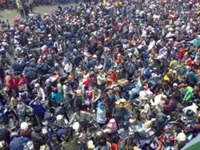PHNOM PENH (Laotian Times): East Asia and Pacific has led in economic growth, but to sustain momentum and create jobs, countries must address global uncertainties. Key challenges include shifting global integration, climate change, and demographic trends.
According to the World Bank Group’s latest 2025 Regional Economic Update , it is expected to slow to 4.0 percent in 2025, affected by global conditions and domestic policies.
China’s growth will decelerate to 4.0 percent due to trade restrictions, policy uncertainty, global slowdown, and property sector weakness.
Growth projections vary across the region: Mongolia 6.3 per cent and Vietnam 5.8 per cent lead, followed by the Philippines 5.3 per cent, Indonesia 4.7 per cent, Cambodia 4.0 per cent, Malaysia 3.9 per cent, and Laos 3.5 per cent, while Thailand lags at 1.6 per cent.
Meanwhile, the growth in the Pacific Island countries is projected at 2.5 percent.
Despite these challenges, the World Bank projects that approximately 24 million people in the region will escape poverty between 2024 and 2025, based on the upper-middle-income poverty line.
“While navigating global uncertainty, countries across the region have the opportunity to strengthen their economic prospects by embracing and investing in new technologies, opening up business opportunities through bolder reforms, and deepening international cooperation,” said Manuela V. Ferro, Vice President of the World Bank for East Asia and Pacific.
WB economists point to three key strategies that could help countries in the region navigate both immediate uncertainties and long-term challenges:
First, accelerating adoption of new technologies could boost productivity and create more jobs, following successful models in Malaysia and Thailand.
Second, implementing reforms to enhance competition, particularly in services sectors, could unlock new economic opportunities as demonstrated by Vietnam’s approach.
Third, deeper international cooperation could strengthen economic resilience in the face of global challenges.
“Combining new technologies with bold reform and innovative cooperation could help countries in the region cope with current environment and longer-term challenges,” noted Aaditya Mattoo, World Bank East Asia and Pacific Chief Economist. “That is the recipe for higher productivity and better jobs.” - Laotian Times





